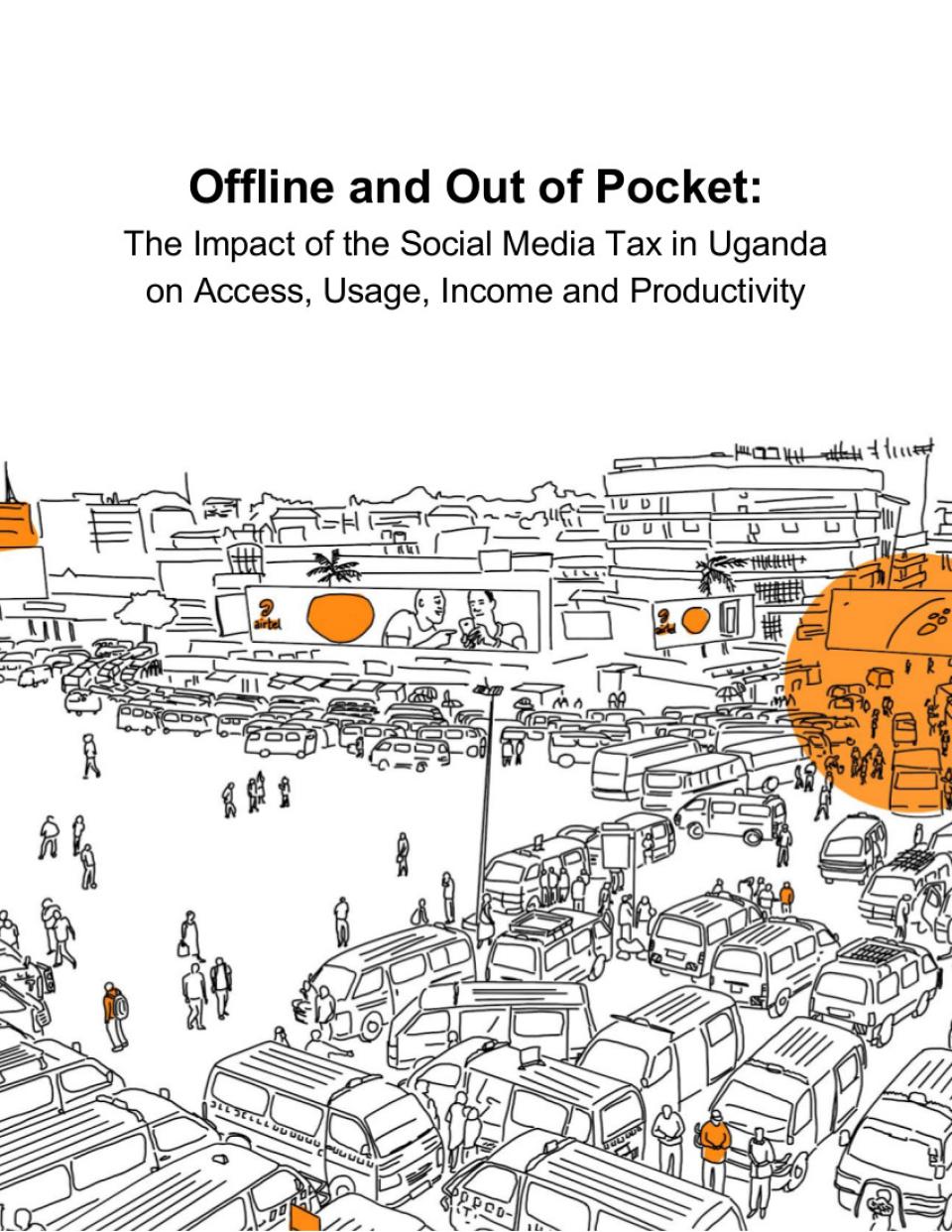
Image description: Illustration of crowded street and billboard. Source: Cover of report by Pollicy
Key findings in the report
Affordability : A quarter (25%) of respondents made an income of less than UGX100,000(US$27) per month. Paying the social media tax for one-month accounts to
>6% of their total monthly expenditures.
Access : Around 56% of persons interviewed pay their social media taxes, whereas 38% continue to use a VPN to access “over-the-top” services.
Usage : A significant drop in accessing social media was reported. While 33% of respondents would access social media platforms more than 10 times a day prior to the
tax, this number dropped down to just 6.6% after the taxation.
Productivity : One-third of respondents used social media for business activities and of these respondents, 74% reported reduced income following the tax implementation.
Approval: A majority of respondents, 86% feel that the social media tax should be removed, with only 7.2% percent feeling that it should not be removed and 6.3% were
neutral.
Introduction
Following a brief tweet stating that ‘social media encourages gossip’ by President Yoweri Museveni of Uganda, a new tax was introduced by the Ugandan Parliament on July 1st, 2018 requiring an excise duty on over-the-top services over the internet. In a letter to the Ugandan citizens, the President wrote that the social media tax is intended to reduce borrowing from outside the country and improve the low GDP:tax ratio. In the national budget speech for 2018/19, it was projected that the new tax would generate projected revenue of up to UGX486Bn (~US$129M) per year by 2022/23.
Following a brief tweet stating that ‘social media encourages gossip’ by President Yoweri Museveni of Uganda, a new tax was introduced by the Ugandan Parliament on July 1st, 2018 requiring an excise duty on over-the-top services over the internet.
What is the Social Media Tax?
The Social Media tax requires users to pay a tax of UGX200(US$0.05) per day to access over-the-top (OTT) services. According to MTN Uganda, OTT services can be defined as “the transmission or receipt of voice or messages over the internet, including access to virtual private networks”. Some of the most notable examples are Facebook, Whatsapp, Twitter, LinkedIn, Instagram, Skype, Google Hangouts, and Tinder. Mail services such as Gmail are not considered a taxable OTT service.
Major internet service providers (ISPs) in Uganda have blocked access to these platforms and a user must first pay their social media tax, on a daily, weekly, monthly, quarterly or annual basis), to access these OTT services. Payments are made using Mobile Money and access would previously expire at midnight, but now lasts a 24-hour period from the time of payment. Furthermore, a 1% excise duty is charged on the mobile money transaction required to pay the OTT tax resulting in a total payment of UGX202.

Source: Pollicy report
Many Ugandans opposed the new taxation and resorted to using circumvention tools such as virtual private networks (VPNs), though telecommunication operators have threatened to block access to these VPNs under the directive of the government. The Executive Director of Uganda Communications Commission (UCC), Mr Godfrey Mutabazi recently commented on this circumvention, “We have all the systems needed to block the virtual private networks already here and the government will move anytime to effect it.”
The Executive Director of Uganda Communications Commission (UCC), Mr Godfrey Mutabazi recently commented on this circumvention, “We have all the systems needed to block the virtual private networks already here and the government will move anytime to effect it.”
A recent tweet by the Uganda Communications Commission showed that tax revenue generated from the social media tax reduced from UGX5.6 billion in July 2018 to UGX3.9 billion at the end of September 2018. There was a marked reduction in the number of subscribers paying the social media tax, from 8.04 million people in July 2018 when the tax came into effect, to 6.84 million in September 2018. The report also stated that the number of internet subscribers dropped by over 3 million in this time period, from 16 million to 13.5 million.
Taxation of Internet-based services has been on the rise across Africa in recent months. In neighbouring Tanzania, bloggers must be vetted by the government and are charged an annual fee of $930 before producing any online content. In Zambia, the government plans to roll out a tax on internet calls at a cost of ZMK0.3 (US$0.03) per day. In Kenya, recent legislation has led to the introduction of new price changes that have increased the cost of internet access through a 50% excise tax hike passed on to customers.
In Benin, a proposal to charge CFA Francs 5 ($0.008) per megabyte of OTT services as well as a 5% fee on OTT services was struck down after a peaceful protest campaign #TaxePasMesMo (“Don’t Tax my Megabytes). Similarly, in Uganda, #ThisTaxMustGo became a rallying cry against the social media tax.
To find out more read the report
Publication date
Year of publication
- 7792 views





Add new comment